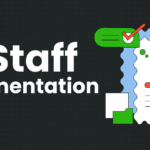Python powers some of the world’s biggest tech giants—Instagram, Spotify, and Netflix—thanks to its versatility and efficiency. But when it comes to web development, choosing the right Python framework can be the difference between a seamless project and a development nightmare.
If you’re outsourcing development, this decision becomes even more critical. Pick the wrong framework, and you risk slow performance, security vulnerabilities, and endless debugging. Choose the right one, and you’ll enjoy faster development, seamless scalability, and a highly efficient outsourced team.
So, which Python framework is the best fit? Should you go with Django’s all-in-one power, Flask’s flexibility, or FastAPI’s blazing speed?
In this guide, we’ll break down the top Python frameworks for web development and help you decide which one your outsourced team should use. We’ll also reveal why making the right choice—and ensuring you hire Python developers with expertise in that framework—can be the key to a successful, cost-effective, and scalable project.
Let’s dive in!
What is Python?
Python is a high-level, versatile programming language known for its readability, simplicity, and wide range of applications. It is widely used in web development, data science, artificial intelligence, automation, and more. Thanks to its clear syntax and extensive libraries, Python has become one of the most popular programming languages globally.
According to the 2024 Stack Overflow Developer Survey, Python remains among the top three most loved and widely used languages, with over 48% of developers using it for professional or personal projects. Major companies like Google, Facebook, Netflix, and NASA rely on Python for its efficiency and scalability.
One of Python’s greatest strengths is its vast ecosystem of frameworks that help developers build web applications faster and more efficiently. But with so many options available, choosing the right framework is critical—especially when working with an outsourced development team.
What Are Python Frameworks?
A Python web framework is a collection of pre-written code and tools that simplifies web application development. Instead of building everything from scratch, developers can use frameworks to handle common tasks like database management, security, and user authentication.
Python frameworks fall into three main categories:
- Full-Stack Frameworks – Provide everything needed for large-scale applications (e.g., Django)
- Micro Frameworks – Lightweight and flexible, allowing more customization (e.g., Flask)
- Asynchronous Frameworks – Designed for high-performance applications (e.g., FastAPI, Tornado)
As of 2024, the most popular Python frameworks are:
- Django – Used by 63% of Python web developers for its all-in-one capabilities.
- Flask – Preferred by 42% of developers for its flexibility and simplicity.
- FastAPI & Tornado – Gaining traction for high-speed API and real-time applications.
When outsourcing web development, it’s crucial to select a framework that aligns with your business needs and your team’s expertise. A well-chosen framework can accelerate development, improve security, and ensure long-term scalability.
Why Choosing the Right Python Framework Matters
When outsourcing Python development, the framework you choose directly impacts your project’s success. Each framework comes with its own set of capabilities, trade-offs, and learning curves, making it essential to align your choice with your business goals, project complexity, and team expertise.
Here’s why picking the right framework matters:
Development Speed & Efficiency: Some frameworks, like Django, come with built-in features that accelerate development, while others, like Flask, provide flexibility for a more custom approach.
Scalability & Performance: A fast-growing project needs a framework that can scale smoothly. FastAPI and Tornado are great for handling high-performance, real-time applications.
Security & Maintenance: Frameworks like Django come with built-in security features, making them ideal for enterprise applications with sensitive data.
Team Compatibility: If you’re outsourcing, your development team’s expertise in a particular framework can make or break your project timeline. That’s why it’s essential to hire Python developers who are skilled in the framework that best suits your needs.
So, which framework should you go with? Let’s explore the top Python frameworks for web development and see which one aligns best with your outsourced team’s expertise.
Top Python Frameworks for Web Development
With so many Python frameworks available, choosing the right one can feel overwhelming. Each framework has its own strengths, and the best choice depends on your project’s complexity, scalability needs, and team expertise.
To make your decision easier, let’s break down the top Python frameworks and explore when to use each one.
1. Django – The All-in-One Powerhouse
Best for: Large-scale applications, enterprise-level projects, and rapid development.
If you’re looking for a framework that handles everything from database management to security out-of-the-box, Django should be at the top of your list.
Django is a full-stack web framework known for its “batteries-included” approach. It comes with built-in authentication, database management, and security features, making it an excellent choice for projects that require a robust and scalable backend. Instagram is one great example that leverages Django to handle its massive user base, ensuring scalability and rapid development.
Why Choose Django?
✔ Rapid Development: Pre-built components speed up development.
✔ Security Features: Protects against common vulnerabilities like SQL injection and CSRF attacks.
✔ Scalability: Used by giants like Instagram and Pinterest for handling millions of users.
Best Use Cases:
- E-commerce platforms
- Enterprise applications
- Data-driven dashboards
When to Hire Python Developers for Django:
If your project requires quick deployment, strong security, and complex data handling, it’s best to hire Python developers with expertise in Django. Their experience will ensure efficient implementation and scalability.
2. Flask – The Lightweight & Flexible Choice
Best for: Small to medium-sized projects, startups, and developers who prefer flexibility.
While Django is great for large, full-fledged applications, sometimes you need more flexibility. This is where Flask shines.
Flask is a micro-framework that provides only the essentials, allowing developers to build applications with more control and customization. Unlike Django, it doesn’t come with built-in features like authentication or database management, making it ideal for developers who want a lightweight, adaptable framework.
Why Choose Flask?
✔ Minimalistic & Flexible: Gives developers more control over project structure.
✔ Ideal for APIs: Frequently used for building RESTful APIs and microservices.
✔ Faster Performance: Since it has fewer built-in features, it runs faster than full-stack frameworks.
Best Use Cases:
- Prototyping and MVPs
- Small web applications
- Microservices & RESTful APIs
Netflix utilizes Flask for some of its microservices, benefiting from its simplicity and flexibility.
When to Hire Python Developers for Flask:
If you need a highly customizable application and want to avoid unnecessary features, hire Python developers skilled in Flask. They’ll help you build a lean, efficient web app with only the necessary components.
3. FastAPI – The High-Performance API Builder
Best for: Asynchronous applications, real-time data processing, and API development.
While Django is great for large, full-fledged applications, sometimes you need more flexibility. This is where Flask shines.
FastAPI is a modern, fast framework built specifically for high-performance web applications and APIs. It’s designed to handle asynchronous programming efficiently, making it one of the fastest Python frameworks available.
Why Choose FastAPI?
✔ Blazing Fast: Up to 300% faster than Flask in API responses.
✔ Asynchronous Support: Ideal for handling multiple requests simultaneously.
✔ Auto-Generated Documentation: Comes with built-in Swagger UI for API documentation.
Best Use Cases:
- High-speed APIs
- Machine learning & AI applications
- Real-time chat applications
FastAPI has gained significant traction in the industry, with many new Python web development projects adopting it for its high performance and modern features.
When to Hire Python Developers for FastAPI:
If your project relies on real-time data, machine learning models, or microservices, it’s crucial to hire Python developers who understand asynchronous programming and API optimization.
4. Tornado – The Real-Time Champion
Best for: Web applications requiring real-time updates, like messaging platforms or live streaming.
For projects requiring real-time communication—such as chat applications or live-streaming platforms—Tornado is a top contender.
Tornado is a powerful, non-blocking web framework designed to handle thousands of simultaneous connections efficiently. It’s perfect for applications that require real-time interactions and low-latency responses.
Why Choose Tornado?
✔ Handles Thousands of Requests Per Second
✔ Asynchronous & Scalable
✔ Great for WebSockets & Live Updates
Best Use Cases:
- Chat applications
- Video streaming platforms
- Financial trading systems
When to Hire Python Developers for Tornado:
If your web app requires real-time communication and high concurrency, hire Python developers with expertise in Tornado to ensure optimal performance. As of February 2025, Tornado is utilized by less than 0.1% of all websites whose web server is known. Specifically, it’s used by 8,244 live websites, with an additional 16,320 sites having used Tornado in the past.
|
Framework
|
Best For
|
Key Strengths
|
|
Django
|
Large-scale apps & security-focused projects
|
Full-stack, secure, scalable
|
|
Flask
|
Small projects & startups
|
Lightweight, flexible, customizable
|
|
FastAPI
|
High-performance APIs & AI-driven apps
|
Asynchronous, fast, auto-documenting
|
|
Tornado
|
Real-time applications & WebSockets
|
Handles high concurrency, low-latency
|
The best framework depends on your project’s complexity, scalability needs, and outsourcing strategy.
· For a secure, enterprise-level application? → Django
· For a lightweight, flexible project? → Flask
· For high-speed APIs and real-time applications? → FastAPI
· For chat apps, WebSockets, and real-time updates? → Tornado
Ultimately, the key to success isn’t just choosing the right framework—it’s ensuring you hire Python developers with expertise in that framework. Skilled developers can optimize performance, ensure security, and accelerate project timelines, making your outsourced development process smooth and efficient.
Hiring the Right Python Developers for Your Outsourced Team
Suppose you’re developing a high-speed API using FastAPI. Your ideal candidate should have experience with asynchronous programming, database management (e.g., PostgreSQL), and API security. If your app is cloud-based, they should also know how to deploy and optimize it on AWS or another cloud platform. Ensuring these skills upfront will prevent roadblocks later in development.
This means, choosing the right Python framework is only half the battle—the success of your web development project ultimately depends on the expertise of the developers you hire. When outsourcing, it’s crucial to ensure that your team has the right skills to implement and optimize the chosen framework effectively.
What to Look for When Hiring Python Developers
Experience with Your Chosen Framework: Not all Python developers specialize in every framework. If you’re using Django, look for developers who understand its ORM, authentication system, and middleware. If FastAPI is your pick, they should be proficient in asynchronous programming and API design.
Knowledge of Best Practices (Security, Performance, Scalability): A well-built web application is secure, fast, and scalable. Your developers should be familiar with techniques like caching, load balancing, database indexing, and secure coding practices to prevent vulnerabilities like SQL injection and CSRF attacks.
Experience in Handling Outsourced Projects & Remote Collaboration: Since you’ll be working with an outsourced team, strong communication skills and experience with remote workflows are essential. Developers should be comfortable with tools like GitHub, Jira, and Slack to ensure smooth collaboration across different time zones.
Proficiency in Related Technologies (Databases, APIs, Cloud Services): A great Python developer doesn’t just know Python—they should also be skilled in complementary technologies that enhance web applications:
Databases: PostgreSQL, MySQL, MongoDB
API Development: REST, GraphQL, WebSockets
Cloud Services: AWS, Azure, Google Cloud
By carefully vetting candidates, you can hire Python developers who not only excel in coding but also align with your project’s technical and operational needs. This ensures a smooth development process and a successful outsourced collaboration.
Conclusion
Choosing the right Python framework is a strategic decision that directly impacts your project’s success. Each framework offers unique benefits, but the real key lies in hiring experienced Python developers who can leverage the framework’s strengths.
Before making a final decision, evaluate your project’s goals, scalability needs, and technical requirements. Communicate with your outsourced team, assess their expertise, and ensure they are proficient in the framework best suited for your web development needs.
By making an informed choice and
hiring the right Python developers you can build a high-performing, scalable, and cost-effective web application that meets your business objectives.






